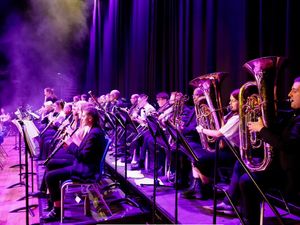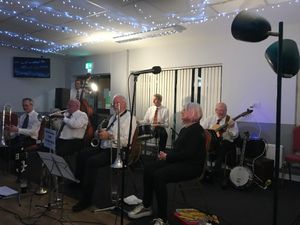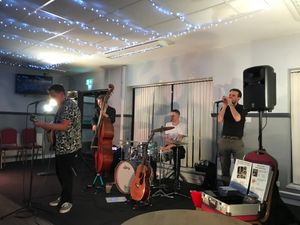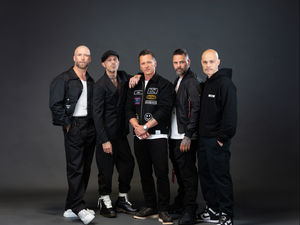Choosing his path: Jack Garratt speaks ahead of second album release
Genre-bending singer-songwriter Jack Garratt talks to Alex Green about anxiety, self-doubt and the joy in his new record.
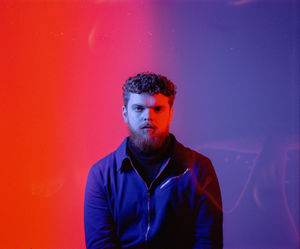
“I wrote this album for me and I have successfully satisfied 100 per cent of that target audience,” says singer-songwriter Jack Garratt as sits down, albeit virtually, for a chat.
“With my first record I was way too obsessed about what other people thought because I was being encouraged to obsess about it – with the awards I won, with the opinion pieces that were being written about me.
“This time around I’m just not accepting that.
“All I know is what I can expect of myself – and I expect greatness.
“I really think I’ve achieved that on this record.”
He’s not wrong.
Expectations for Love, Death And Dancing, Garratt’s second album released in early June, were considerably lower than 2016’s Phase. But they were still high.
Garratt, from the village of Little Chalfont in Buckinghamshire, was 24 when, in 2016, he won the Brits’ Critics’ Choice Award as well as the BBC Sound of 2016 poll, following in the footsteps of Adele, Sam Smith and Ellie Goulding.
His free-wheeling, genre-bending debut album saw him hailed as a mad scientist, with various critics attempting to pigeon-hole him as the next James Blake, Bon Iver and even Ed Sheeran.
However, Garratt was not ready for the sudden fame.
His anxiety, a fixture of his youth, spiralled, only exacerbated by heavy touring, and plagued by self doubt, he recorded an album only to scrap it.
This was compounded by an increasingly sceptical, sometimes critical, press, with more than one publication labelling him a “Jack of all trades” over his sundry musical style.
“Jack of all trades – master of none,” he recalls from his home studio.
“I love that. That’s great. And then I won these awards and immediately I was ‘award winner’.
“I was ‘the future of UK music’ and I was being compared to previous winners and therefore similar to previous winners like Adele, Sam Smith and Ellie Goulding.
“It immediately stunted my growth, the trajectory of the growth I was about to take.
“It wasn’t perceived pressure, it was actual pressure from an industry, from the public and from journalists – a pressure that no one is ever taught to prepare for because it only happens to one person a year, maybe.
“And yet when I was going through the pressure I was expected and encouraged to either just brush it off or deal with it.
“At no point was I really given the option to actually express my grievances.
“Because whenever I did express them or I did talk about how confused – confused is the best word for it – I was and how difficult I was finding it to deal with, I was simply told: ‘Be quiet. You’re privileged and lucky and you just have to be alright with it’ and so I did.
“I just kept myself quiet and it ended up ruining what should have been the height of my career.”
On release, the left-field Phase made it to number three.
But in comparison to his award-winning predecessors – Goulding with her chart-ready take on electro-folk or Smith with his neo-soul – it looked like less of a triumph.
Garratt started work on his sophomore album but became disillusioned (“It was trash”) and took time away to deal with his anxiety and self-doubt.
Eventually, he was coaxed into the studio with Jacknife Lee, a veteran record producer who has worked with U2, Robbie Williams, the Killers and many more.
The result was a suite of songs exploring the events of the past four years – the joys of his marriage, the breakdown he suffered while living in Chicago.
“I didn’t know I was writing something positive until I started playing in front of people,” he enthuses.
“I thought I was writing something that was intending to be honest, and at the time I was translating honesty to be something that was quite dark and baring.
“It was only when I started playing it for other people that I realised that there was more vocabulary to it than that.”
Garratt describes Love, Death And Dancing as a “reclamation” – of music as something personal, of his freedom to choose his own path in the industry.
Its 12 songs, with titles like Mend A Heart and Doctor Please, mesh tightly despite their genre-bending, erratic style.
“It’s about a time in my life that I feel like I lost,” he explains.
“This is my attempt to reclaim that, to take ownership over a period of my life where my confidence was at its lowest, my opinion of myself was at its lowest, my trust in myself was at its lowest.
“And there I was expecting myself to make art that I liked from that.
“It was a really difficult challenge but all I knew I could do was make it from a place of absolute honesty and that’s what I’ve done.”
Garratt has learned many lessons in the past years, including how to take care of his mental health, a skill proving essential during lockdown.
“There’s an unrealistic expectation for every artist to sit at home and make something that’s going to entertain the masses,” he says with conviction.
“That’s an abusive way to look at artists in general, in any capacity.
“I’m not a social media influencer so I’m not going to spend all of my time on social media engaging with fans.
“I also understand that that’s an important part of my job so I’m still active and do that.
“What I really try to do is not give absolute control over to this horrific situation.
“I don’t want to give it control over how I should feel with what’s going on.
“It is the reason, the harrowing and depressing reason, for why we’re all having to be inside.”
Love, Death And Dancing is out now.

